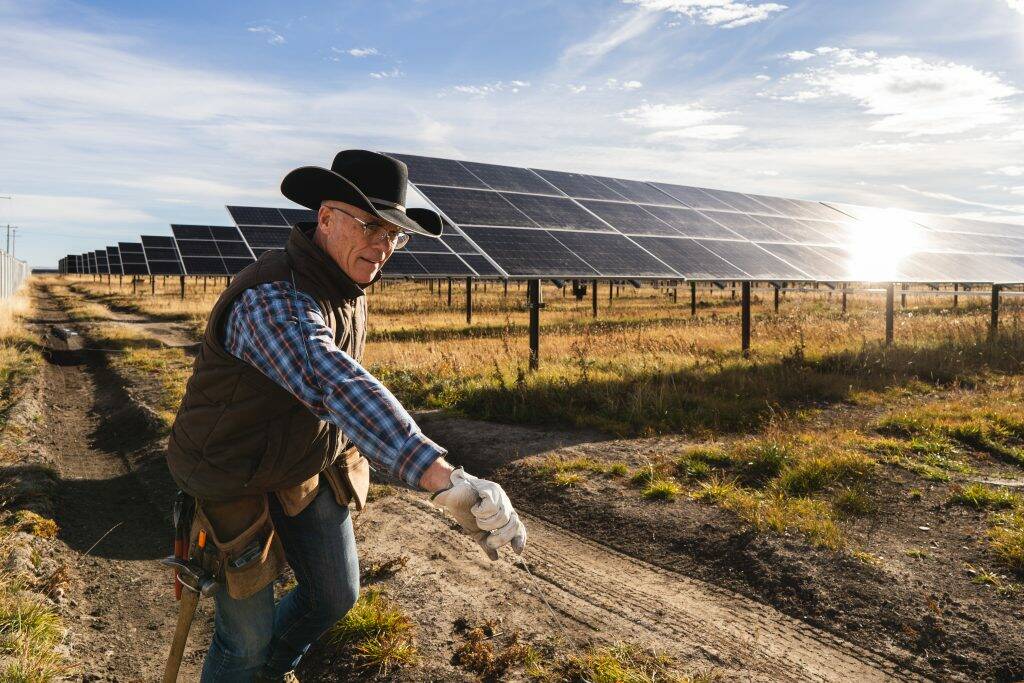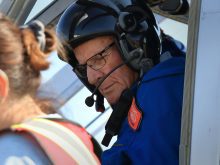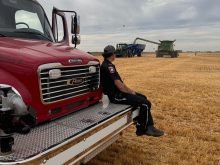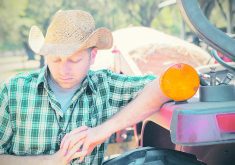Farmer learned invaluable lessons, which he now passes on to others, after he was caught in a swather reel 20 years ago
A beautiful July day is perfect for swathing. Friday, July 20, 2001, was no exception.
Ernie Penney, who operates a mixed farm just outside Moose Jaw, went out before 9 a.m. to swath hay.
The day before, Penney had battled the new-to-him used 800 self-propelled John Deere swather that kept plugging on the fine hay.
He had stopped about 20 times the day before, getting out to clear the knives and guards and unplug the canvas and intake.
This day didn’t look much better. On the second round, the swather plugged again. As he had done so many times the day before, he disengaged the controls but didn’t shut off the engine.
Read Also

Support needed at all levels for high-value solar projects
Farmers, rural municipalities and governments should welcome any opportunity to get involved in large-scale solar power installations, say agrivoltaics proponents.
Penney explained: “it was an old piece of equipment and you never have the best batteries. You just shut all of the equipment off but you leave the motor running. Guys do it in combines. Guys do it in swathers. Guys do it in haybines. Guys do it in everything, farming. That’s just the way it is, because the majority of us have substandard equipment. And you can’t get them started once you shut them off. So we leave them running.”
That’s when the unthinkable happened.
On his hands and knees, pulling hay to free the jammed knives, Penney recounted: “It was windy, and the lever was rattling. I guess the lever popped over enough to engage everything. And the reel hit me in the back. And I’m pushing as hard I can, and the canvasses are turning in front of me, but the guard, the knife, is still jammed. And I’m pushing on the reels. Everything’s squealing around me.”
“The guards were in the right-hand side of my chest. All I can think in my mind is, what the hell is happening?”
With Penney pushing to get free and the reel with its rubber tines whomping across the back, his shirt, pants and underwear were soon in shreds. He finally managed to push back from the jammed knife, and the reel pushed him through onto the table. He jumped out.
Penney knew he was badly hurt. He pulled his right arm tight across his torso and closed the flap of his left armpit. He doesn’t remember shutting off the swather or walking to his truck.
His first plan was simple.
“I thought, ‘well, I”m only five minutes from the hospital. I’m just going to drop it in gear. I’m going to drive through my barbed-wire fences and show up at the hospital.’
“Well, with my occupational health and safety training, stress training, and shock training, and all the rest of it, I thought ‘no, this isn’t a good idea.’ ”
Instead, he got to the yard, and with help from his wife, got to the emergency room.
Penney said, “I was in a farming accident. I need some stitches.”
Not just “some”. Over the next five hours, the doctor sewed Penney back together.
There was a gash in his right thigh down to the bone. There was a hole the size of a pop can by his hip bone. His left armpit muscle had to be pulled back into place and stitched.
Then there was his chest.
“I could have bled out in the field right there,” Penny said. “The doctor said he could see the aorta of my heart.”
The reel had ripped the ribs off his sternum. The doctor had to push each rib back into place, then sew him up.
“The stitch count just on my chest alone was 65 stitches on the outside, to put my chest back together.”
What was remarkable is that Penney was awake through the whole thing: the incident, the drive to the farm and into town, and all the stitching and X-rays to put him back together.
It wasn’t until he got to his room and moved himself from the gurney into the bed that Penney finally blacked out.
“I’m very fortunate that I lived through it. It’s entrenched in my mind every day. There hasn’t been a day since 2001, that you know it’s not burned into my brain, that it’s something I don’t think about, it’s always there, right. And that’s my story.”
A massive injury of this scale is more than just the event. The rehabilitation process was long. The injury happened in July. Physio started in September when the scabs had healed.
He didn’t drive until October. He worked part time starting in June, then full time the following January, a year and a half after the accident.
That’s a long time for a farmer to be injured and not at full capacity.
Penney shares his story at occupational health and safety meetings, at auction sales and at farm shows.
He’s changed his farming practices. Penney makes sure the swather table and reels are fully lifted before doing any work. He stocks up on new batteries as a safety precaution.
“A farmer is more likely to shut machinery off to work on it if you trust it will start again,” he said.
All his grandchildren have been taught how to shut off equipment.
“I’m always teaching them safety. You know if a piece of equipment starts acting up, shut it off and walk away. If something is stressing you out, you’re better to walk away from it. We’ll figure it out later. Don’t put yourself in harm’s way.
“I don’t take the risks like I used to take. Like I’ll sit back and watch a piece of equipment fly apart before I go in there to try to shut it off.”
Penney added: “People take things for granted, especially the younger generation. The younger generation has no idea how dangerous some things are, right? Just something simple, like a pair of safety glasses or a hard hat, or gloves, you know?”
Since the accident, Penney’s life philosophy has changed. A regular volunteer, he is known for local escapades such as The Penneymobile, a 1971 Toyota encrusted in pennies. Penney and his various penny-raising campaigns, including the car, helped raise money for the library in Moose Jaw.
Penney chaired the Terry Fox Run for 10 years in Moose Jaw, and he met both Terry’s mother and brother. He and his goats entertained Rick Mercer at Regina’s Canadian Western Agribition for This Hour Has 22 Minutes. In summer 2023, he was part of the soap box derby in Moose Jaw.
“You’re only given one chance in life,” he said.
And the swather? Penney kept it. His fondest wish is that the air force base will come by with its big double-bladed helicopter and tie onto the swather, lift it up into the sky so high that he can’t even see it — and then drop it.
Merle Massie is a professional research associate at the Canadian Centre for Rural and Agricultural Health.















